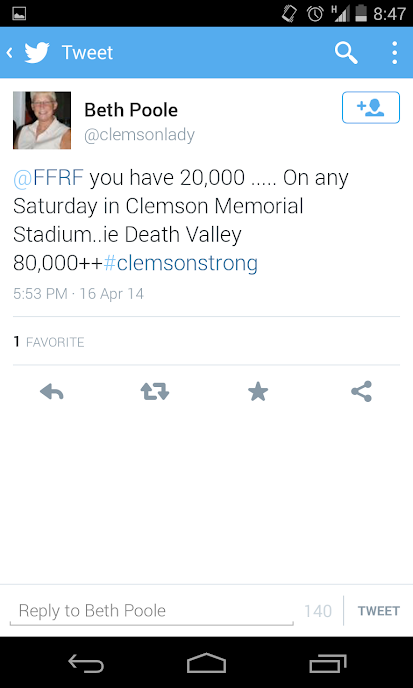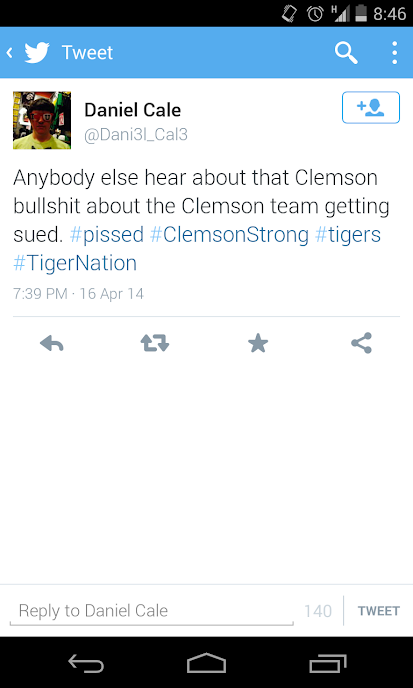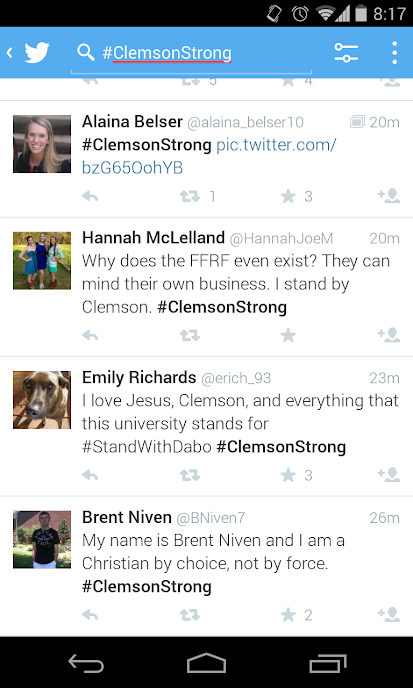One day, I'll actually post about science again (hopefully this term because I'm taking a seminar on getting more involved with science communication!) Instead, it's another round of "I love you, but I'm disappointed in you" to the Clemson community.
From last time:
Some of my best memories are at Clemson (if anyone at this point is questioning devotion, I graduated from there and by virtue of Tiger Band for four years attended all home games in my time), and my favorite part is the Clemson family- the idea that all Tigers, no matter your stripe, are bonded by this school. Taking a step back it sounds hokey, but in person my experiences were overwhelmingly positive. When I read posts like the above, I honestly question the welcomeness I felt. Is the Clemson family only a veneer, that only certain members can be considered 'family'? I'd like to think not. #ClemsonStrong shouldn't be about pounding chests for the faith or starting another Crusade, but rather embracing our diversity as what MAKES Clemson a strong institution.
Weird, that the words still mostly apply about nine months later. Again, we see a majority feel persecuted, but this time it's a different minority, and one that cannot be closer to the Clemson family... because it IS a part of the Clemson family.
If you haven't paid much attention to what's going on around TigerTown, there's been a string of negative incidents over the last few months.
- Following Darren Wilson's lack of conviction and the lack of indictment in Eric Garner's death (recap for both incidents here), protests against racial profiling and police brutality took place in cities and on campuses across the country, including Clemson. A small but passionate group of students led several protests, including a "die-in" on Bowman Field. On the app YikYak where users anonymously post and others can up or downvote them, there was a small but vocal counter response:

- Shortly after the uproar over anonymous insensitivity, history repeated itself and a greek organization hosted a 'Cripmas' party. When the story first broke, quite a few commenters mentioned they didn't see it as offensive, putting it on the same level as mafia or wild west themed parties. While well-intentioned, such sentiments missed the point that having a 'gangsta' themed party soon after the Michael Brown decision (in which some media outlets and peanut galleries called the teenager a 'thug) was poorly timed, not to mention the trivialization of gang brutality.
- In response, See the Stripes organized a student protest on Library Bridge. President Clements was present and addressed student questions. He later sent out an email encouraging the Clemson family to come together and announcing several initiatives towards discussing diversity in 2015.
- 2015 is here! Members of Clemson's faculty, staff, and student body marched from Death Valley to Sikes, airing a list of grievances of when the university "failure to fulfill and uphold Mr. Clemson's vision and its own mission, particularly to "educate undergraduate and graduate students to think deeply about and engage in the social, scientific, economic and professional challenges of our time" among other things.
- Clemson's Faculty Senate votes to rename Tillman Hall, but tables the motion. The facutly senate can't actually change the name, but can make a recommendation to the Board of Trustees, which can then bring it up in the state legislature.
Now we're caught up. And Tiger Nation? I love you, but man do we need empathy everywhere.
While there are those that agree with the proposal, I've seen mostly a backlash (and maybe that's my feeds, but it feels large... like a majority maybe...). It falls into a few categories, illustrated here by various facebook, twitter, and change.org comments, mostly that the name is traditional/iconic for Clemson. Curiously, despite Tillman being a seminal figure in the creation of Clemson University, the building we now know today as Tillman was the "Old Main Building" until 1940 when Tillman's son pushed to rename it (ironically because he felt his father's legacy was being forgotten).
I'm not going to weigh in on whether it should or should not be changed. If I had the answer, I'd probably be forwarding it to the faculty senate and board of trustees, but there's no easy solution here. Tillman's actions are reprehensible- this goes beyond the racist attitudes of the day, but
outright murdering people and bragging about it. He also was instrumental in Clemson's founding. They don't cancel each other out, but there's no simple metric for measuring impact against each other.
Instead, I'm going to focus on how some of the backlash, though well-intentioned, is antithetical to the idea of the Clemson Family.
Mostly, the ones that say "If you don't like it, don't go here." I don't know if it's a vocal minority, but I keep seeing it.
It also seems a little weird to me to accuse a minority of bullying the majority- "You made me uncomfortable with your uncomfortableness", essentially.
Thjs one is pretty disappointing. I know HillWatch aligned with #ClemsonStrong last spring, but the account was entertaining enough. Outright telling students to leave? Nope, unfollowed.
Unlike the #ClemsonStrong reaction, it's not an outsider group asking for change. It's students, staff, and faculty AT Clemson! To me, this is an incredibly rude thing to say, especially if these students, faculty, alumni, etc. have been involved with Clemson just as long as (if not more than) some of the people telling them to go. This is what saddens me even more.
There's also seems to be this idea that the students who feel uncomfortable are just making trouble out of nothing:
And then there's just plain racism:
Not explicitly racism, but honestly if Mr. Tillman were alive today I don't think most of the students protesting would have the opportunity to attend this school.
There was also a weird thing on twitter Friday (1/16/2015) where a YikYak accused black students of only getting in because of their race and users both refuting that and sharing it. Not even going to touch that, just giving it a huge side-eye (because this is something I can DEFINITELY relate to).
To be completely honest, I wasn't aware of the full extent of "Pitchfork" Benjamin Tillman's actions until I read many of the articles that were posted this week. Perhaps this is evidence that we've already swept history under the rug? Renaming might not be the answer, but the conversation we're having about weighing his contributions to the university versus his reprehensible actions (calmly murdering a state legislator in the name of Anglo-Saxon purity) needs to happen.
As I said earlier, I firmly believe in the idea of the Clemson family. When I was talking to a fellow graduate (who is also a person of color), she responded that yes, it's a family... but if something happens we break into smaller groups and shit hits the fan. I'd like to think my alma mater is better than this. I don't want to give up on my peers, especially if they should know better
because they went to Clemson. Black students only make up
6% of Clemson's student body versus
28% of South Carolina's population (both are higher than
my hometown's 0.4%). Voices shouldn't be ignored just because it's not as popular an opinion- these are our brothers and sisters in orange, so if you truly see orange instead of race,
LISTEN.
I'll close with some words from President Clements:
1/19/15- minor edits- accidentally said "Clemson" instead of "Tillman" in recap, also duplicate of a screenshot
 Resurrection Science: Conservation, De-extinction and the Precarious Future of Wild Things by M.R. O'Connor
Resurrection Science: Conservation, De-extinction and the Precarious Future of Wild Things by M.R. O'Connor





















